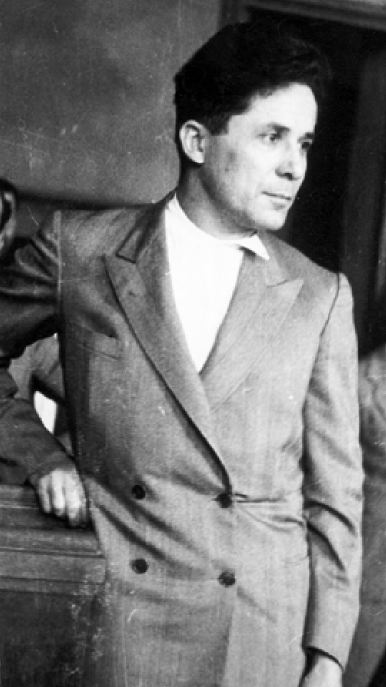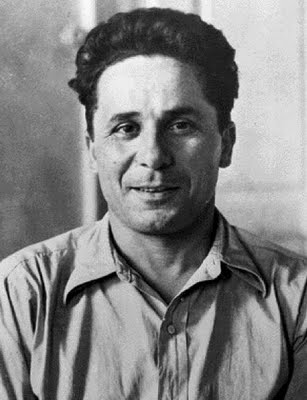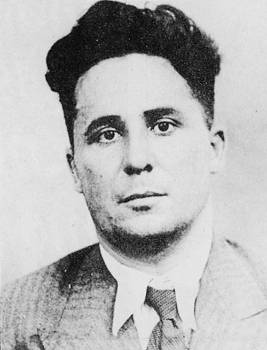<Back to Index>
- General Secretary of the Communist Party of Greece (KKE) Nikos Zachariadis (Νίκος Ζαχαριάδης), 1903
PAGE SPONSOR



Nikolaos Zachariadis (Greek: Νίκος Ζαχαριάδης; 27 April 1903, Adrianople, Ottoman Empire - 8 August 1973, Surgut, Russian SFSR, Soviet Union) was the General Secretary of the Communist Party of Greece (KKE) from 1931 to 1956.
Born in Adrianopole in 1903, the son of an employee of the Ottoman tobacco monopoly. He worked as a seaman on the Black Sea, where he came under the influence of the Bolshevik Revolution. He studied at the International Lenin School and the Communist University of the Toilers of the East (KUTV) in Moscow.
In 1923, he was sent back to Greece to organize the Young Communist League of Greece (OKNE). Imprisoned, he subsequently fled to the Soviet Union. In 1931, he was sent back to Greece to restore order in the highly factionalized KKE and in the same year (other accounts claim 1935), he was appointed, by order of Joseph Stalin and the Comintern, General Secretary of KKE.
In August 1936, he was arrested by the State Security of the Ioannis Metaxas regime and imprisoned. From prison, he issued a letter urging all Greeks to resist the Italian invasion of October 1940 and transform the war into an anti - fascist war. According to KKE, which considered the war to be a feud between imperialist opponents, this letter was fabricated by the Metaxas regime. Zachariadis was even accused of releasing it to win the favor of Konstantinos Maniadakis and be released from prison.
On November 16, 1940, a second letter was released by Zachariadis which accused the Greek army of waging a "fascist" and "imperialistic war" and appealed to the USSR to act against the Metaxas regime. In a third letter (January, 1941), Zachariadis reiterated this position, and reasserted KKE’s position for the secession of Greek Macedonia from Greece.
KKE's anti - war position was definitively reversed when Germany surprise - attacked the USSR on June 22, 1941. KKE then called upon the Greek people to resist the fascist and Nazi invaders, and the resistance group National Liberation Front - Greek People's Liberation Army (EAM - ELAS) were formed.
After the German invasion of Greece, in 1941 the Nazi Germans transferred him to the Dachau concentration camp, from where he was released in May 1945. Returning to Greece, he re-assumed the leadership of the KKE from Georgios Siantos, acting general secretary of the KKE since January 1942.
Zachariadis conducted the military operations of the communist Democratic Army of Greece, which was formed to install a socialist People's Republic in Greece, part of a supposed Union of Soviet Democracies in the Balkans. According to the official KKE party line, Greece at the time was in the British sphere of influence. During the civil war,
the communist uprising was defeated in 1949, and the KKE leadership and
the remnants of the Democratic Army fled into exile in the communist
states.
The leadership of the Communist Party found refuge in Tashkent. From abroad, Zachariadis still enjoyed a mandate by the Soviet Union to act as leader of KKE. However, following the death of Joseph Stalin in 1953, Zachariadis fell out of favor with the new Soviet leadership, despite his support by a large number of party members.
In May 1956, during the 6th General Assembly of the Central Committee of KKE, the Communist Party of the Soviet Union intervened to expel Zachariadis from the post of General Secretary. In February 1957 Zachariadis was also expelled from KKE, as were a large number of his supporters.
Zachariadis spent the rest of his life in exile in Siberia, initially in Yakutia and later in Surgut. In 1962 desperate from the devastating conditions of his exile, he somehow managed to reach Moscow. There he visited the Hellenic (Greek) Embassy and he asked that he be transported to Greece where he wanted to stand trial for his crimes. Whether or not his request was taken into consideration is not known. Immediately after he exited the Hellenic embassy he was arrested by the Soviets and was taken to Surgut. There, according to KGB claims, he committed suicide in 1973. According to other versions he was executed. As of today, the Russian state archive records relating to the circumstances of his death remain secret.
In December 1991, just a few days after the fall of the Soviet Union, Zachariadis' corpse was returned in his homeland, Greece, and he was given a funeral, which gave his supporters the opportunity to honor him.